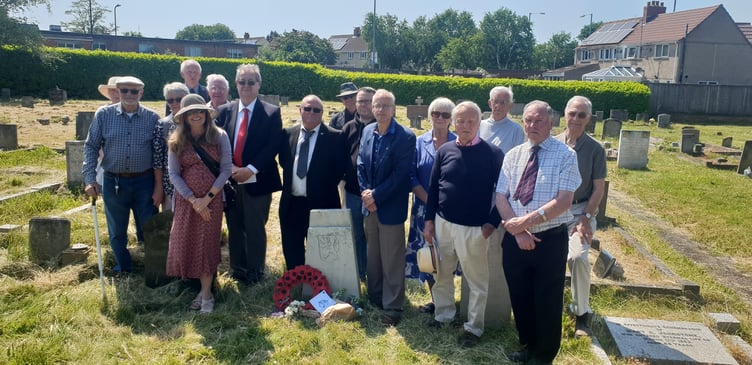FLOWERS were laid and a Second World War Hurricane fighter aircraft flew past as a Czech pilot was remembered with a graveside gathering on the 80th anniversary of the crash near Wellington in which he died.
Jaroslav Cermak was killed on June 4, 1943, when a wing of his Spitfire clipped the top of a train carriage and sent his aircraft cartwheeling into a field at Langs Farm, Bradford on Tone, just to the east of what is known today as Three Chimneys.

Flying Officer Cermak was serving in the Royal Air Force Volunteer Reserve 61546 313 (Czech) Sqdn stationed on the Blackdown Hills at what was then Tricky Warren Aerodrome, Churchstanton, today known as Culmhead.
He was 26 years old when he died.
A short ceremony of remembrance was organised on Sunday at his grave in St Mary’s Cemetery, Taunton, by Wellington Museum and Local History Society member Chris Penney.
Mr Penney said it had been a ‘chance conversation’ which led to the realisation of the anniversary of the Czech pilot’s death.
He said: “A lot of Czech and Polish forces fought with us in the war but they have often been forgotten about because they did not make the history books, and, sadly, this is one such example.”
Brian Lane-Smith, chairman of the South West Heritage Airfields Trust, which runs visitor centres at Dunkeswell and Smeatharpe airfields, started the graveside tributes.

+ 4
(View All)
The gathering at Flying Officer Jaroslav Cermak's grave.
Mr Lane-Smith said: “We recognise the sacrifice of this young man and his colleagues.”
He said the accident happened as Flying Officer Cermak was carrying out a mock attack on a train on the main railway line through the village.
Such practice was needed to help improve the skills of pilots in the squadron who were regularly sent on sorties to strafe German trains in France to disrupt the movement of soldiers and weapons.
Amyas Crump, of the Great Western Society, who grew up and attended school in Bradford-on-Tone, placed a wheel from Flying Officer Cermak’s Spitfire on his grave, which had been recovered from a hedge.
Mr Crump said his interest in the case began in the 1960s when the BBC had made some inquiries locally about the incident and he took up the investigation and met the son of the farming couple who owned the land and witnessed the crash.
He said the story of what had happened to Flying Officer Cermak was incomplete and he would welcome any further information that anybody might have.
Former Bradford-on-Tone parish councillor David Richards, who has researched the accident in depth, took a dossier of information to the informal service.
Parish council chairman Cllr Dennis Venn said Flying Officer Cermak was among many groups of flyers who came to Britain to fight in the war.
Cllr Venn said: “We have to be very thankful to them. He was not just doing it for his country, he was doing it for all of us.”
Tributes to Flying Officer Cermak were also given by Cllr Venn in a Sunday morning service in Bradford-on-Tone’s St Giles’ Church, which shares its name with the Gothic church in his home town of Nymburk, on the River Elbe in the Czech Republic.





Comments
This article has no comments yet. Be the first to leave a comment.